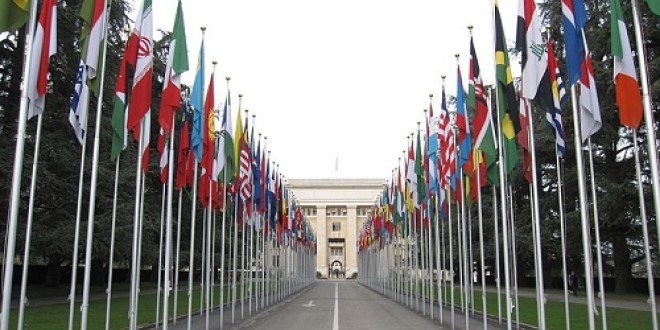
56th Round of Geneva International Discussions
The 56th round of the Geneva International Discussions (GID) – the multilateral forum to address security and humanitarian consequences of the Russo-Georgian War of August 2008 – was held on 5 October in the Palais des Nations after a nearly one-year pause.
Background on 56th Round of GID
The decision to postpone talks led to the Russian Foreign Ministry issuing several statements in response, the latest in June, which called for the talks to be moved from Geneva to a “more neutral place acceptable to all participants.” The Russian MFA cited the “destructiveness of the steps taken by the United States, the European Union, the OSCE, as well as Switzerland, which creates serious obstacles to the normal functioning of the Geneva format” behind its demand.
Later on, in July, Kremlin-backed authorities in occupied Abkhazia issued a similar call to move the talks to “another, less biased place and city, where there will be great opportunities and working conditions for all parties in the negotiation process.”
Responding to Civil.ge about similar Russian accusations in the past, EUSR Toivo Klaar said “the decision to postpone the recent round was taken in order to protect the process and to avoid a situation where the international environment, in particular the war in Ukraine, would negatively affect the proceedings of the round itself and thereby of the GID as a whole.”
GID Co-Chairs’ Assessment
The GID Co-Chairs welcomed the holding of the 56th round of GID and underscored that the process “continues to serve as the only platform where the consequences of conflict are addressed and other important issues are discussed.”
The Co-Chairs’ press release made note of the fact that the round was the first to be held since December 2021 but highlighted that the channels of communication between the Co-Chairs and participants remained operational during this period.
The Co-Chairs also reiterated their appreciation of the participants’ commitment to the GID format.
Positions Taken: Georgia
The Georgian Foreign Ministry stated that the discussion focused on the core agenda items of GID as related to the full implementation of the provisions of the EU-mediated 12 August 2008 Ceasefire Agreement.
To that end, the Georgian delegation accentuated the need for “the safe and dignified return of internally displaced persons (IDPs) and refugees to their homes.”
Positions Taken: Russia, Sokhumi, Tskhinvali
The Russian Foreign Ministry said that the Russian representative emphasized the “destructive nature” of the decision to pause the GID talks in March and “pointed out the inadmissibility of a repetition of such a situation.”
In that context, the Russian MFA expressed concern about the “ongoing attempts to make the Geneva discussions a hostage to events in other regions and the general geopolitical situation as a whole,” and called on the Co-Chairs to avoid “politicizing the negotiation process…”
The Russians also reiterated their position for Tbilisi, Sokhumi, and Tskhinvali to sign a legally binding agreement guaranteeing the non-use of force.
Per the Russian MFA’s statement, all participants “confirmed their interest in restoring a regular negotiation process…”
According to the Abkhaz “foreign ministry,” Sokhumi supported the Russian call for an agreement on the non-use of force.
The Abkhaz authorities also expressed their concern regarding the “military buildup” of Georgia with the support of the U.S. and other NATO countries and the recent joint military exercises conducted in Georgia. They claimed that such exercises “pose a real threat to peace and stability in the region.”
During the talks, Sokhumi also voiced its interest in resuming the work of the Gali Incident Prevention and Response Mechanism (IPRM) format.
According to the Tskhinvali-based RES news agency, S. Ossetia participants raised the issue of “ongoing periodic border provocations from the Georgian side […] and the need to continue marking the state border line with structures…”
Tskhinvali also sided with Russia and Abkhazia on their insistence on a non-use of force agreement and expressed “serious concern over the expansion of NATO’s presence on Georgian territory…”
No date has been set yet for the next round of GID.
Note: This article was updated on 6 October at 12:42 to reflect the comments of Tskhinvali.
Also Read:
- 09/12/2021 – 55th Round of Geneva International Discussions
This post is also available in: ქართული Русский